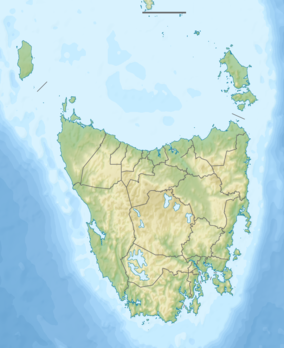 George Rocks Location of Bird Rock off the coast of Tasmania | |
| Geography | |
|---|---|
| Location | Banks Strait, Bass Strait |
| Coordinates | 40°55′S 148°19′E / 40.917°S 148.317°E |
| Archipelago | Waterhouse Island Group |
| Area | 7 ha (17 acres) |
| Administration | |
Australia | |
| State | Tasmania |
| Demographics | |
| Population | uninhabited |
The George Rocks, also historically known as King George's Rocks, is part of the Waterhouse Island Group, a group of three adjacent uninhabited granite islets and associated reefs with a combined area of 7 hectares (17 acres), situated in Banks Strait, part of Bass Strait, lying close to the north-eastern coast of Tasmania, Australia.[1]
Seal hunting took place early in the 19th century. Captain James Kelly took seals there in 1816, and Thomas Tucker is recorded sealing on the rocks in 1827. Captain Kelly applied for a lease to establish a bay whaling station at a small sandy beach on the west side of the largest of the rocks in 1841[2]
Other islands in the Waterhouse Group include Ninth, Tenth, Waterhouse, Little Waterhouse, Maclean, Baynes, Gygnet, Swan, Foster, Little Swan, St Helens and Paddys islands and Bird Rock islet.[1]
Fauna
Recorded breeding seabird species are little penguin, short-tailed shearwater, white-faced storm-petrel, silver gull, black-faced cormorant and crested tern. Introduced mammals are rabbits and rats (it was announced in February 2021 that all the rats had been eradicated). The metallic skink is present.[1]
See also
References
- 1 2 3 Brothers, Nigel; Pemberton, David; Pryor, Helen; & Halley, Vanessa. (2001). Tasmania’s Offshore Islands: seabirds and other natural features. Tasmanian Museum and Art Gallery: Hobart. ISBN 0-7246-4816-X
- ↑ Kostoglou, Parry (1996). Sealing in Tasmania historical research project (First ed.). Hobart: Parks & Wildlife Service. pp. 75–6.